In the summer of 1773, 245 years ago, cultural revolution was in the air in London. It had been a year after the landmark Mansfield ruling that would begin to see slavery gradually outlawed in England. At the same time, over in Boston in the US, the American Revolution was gathering pace, with the Boston Tea Party only a few months away. With war bubbling in the background, relations between London and Boston were tense but one young girl would rise above it.
Phillis Wheatley, originally from West Africa, was taken to Boston in the US in 1761 at age seven and immediately sold into slavery. Fast forward 12 years and in 1773, 20 years old, she would find herself in London seeing her first book of poetry published with support from the Lord Mayor of London, making her the first Black African-American Poet to be published.
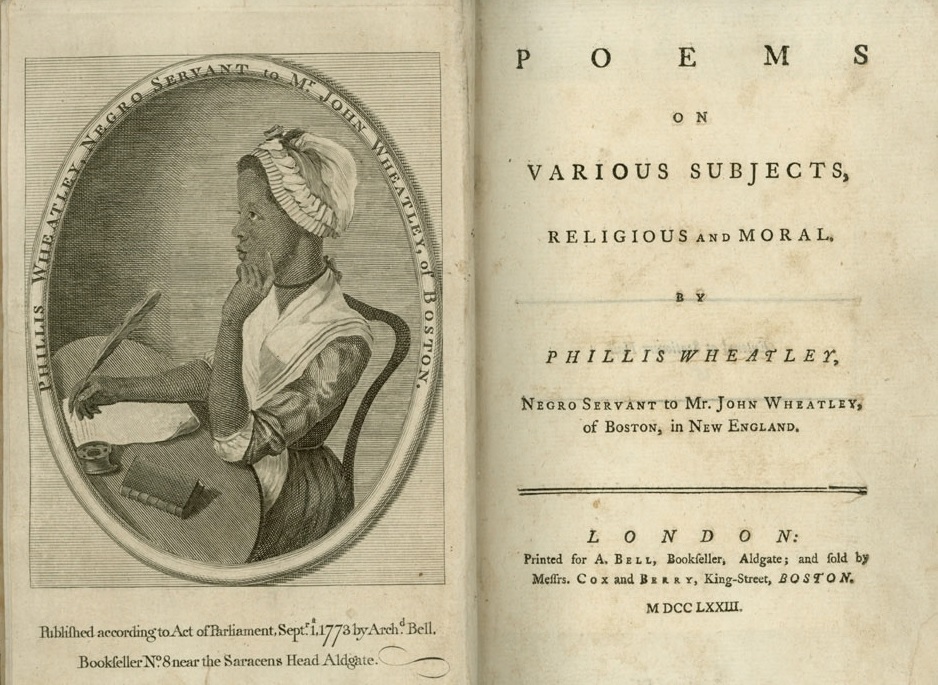
From Trial in Boston to Stage in London:
Poems on Various Subjects, Religious and Moral (1773) brought her fame both in England and the American colonies. As well as an audience with the Lord Mayor of London, Phillis met with other significant members of British society. An audience with George III, who was admirer of her work, was also arranged but sadly cancelled because Phillis had to return to the US to be by the side of her dying mistress. She also received high praise from figures such as George Washington and also Voltaire who stated in a letter to a friend that Wheatley “had proved that black people could write poetry”.
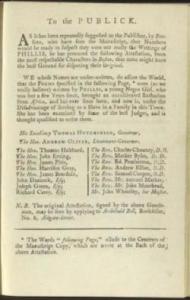 Getting to this stage was no easy
achievement. Many colonists found it difficult to believe that an African slave was capable of writing good quality poetry. Phillis Wheatley had to defend herself as the author of her own poetry in court in 1772 when
she was examined by a group of Boston luminaries, including John Erving, Reverend Charles Chauncey, John Hancock, Thomas Hutchinson, the governor of Massachusetts, and his lieutenant governor Andrew Oliver. They eventually
concluded she had written the poems ascribed to her and signed an attestation (shown here on the right). However, publishers in Boston had declined to publish her work, and the Wheatleys thought that she would have
more success in London – they were right.
Getting to this stage was no easy
achievement. Many colonists found it difficult to believe that an African slave was capable of writing good quality poetry. Phillis Wheatley had to defend herself as the author of her own poetry in court in 1772 when
she was examined by a group of Boston luminaries, including John Erving, Reverend Charles Chauncey, John Hancock, Thomas Hutchinson, the governor of Massachusetts, and his lieutenant governor Andrew Oliver. They eventually
concluded she had written the poems ascribed to her and signed an attestation (shown here on the right). However, publishers in Boston had declined to publish her work, and the Wheatleys thought that she would have
more success in London – they were right.
Selina, Countess of Huntingdon and the Earl of Dartmouth acted as patrons to help Wheatley gain publication in London in 1773. The attestation by the Boston luminaries was included in the first editions of Poems on Various Subjects, Religious and Moral. It serves as a fascinating piece of publishing and literary history; an important inclusion to show the barrier faced and how difficult it was to get published as an African-American, a slave and, of course, a woman.
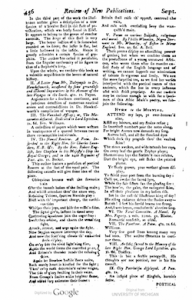 Her poem 'Hymn to the Morning' was also published in The London Magazine or Gentleman's monthly intelligencer (as it was also known) in 1773, which was introduced, as follows: "these poems display no astonishing works of genius, but when we consider them as the productions of a young, untutored African, who wrote them after six months careful study of the English language, we cannot but suppress our admiration for talents so vigorous and lively."
Her poem 'Hymn to the Morning' was also published in The London Magazine or Gentleman's monthly intelligencer (as it was also known) in 1773, which was introduced, as follows: "these poems display no astonishing works of genius, but when we consider them as the productions of a young, untutored African, who wrote them after six months careful study of the English language, we cannot but suppress our admiration for talents so vigorous and lively."
Phillis Wheatley’s commitment to educating herself, support from her progressive slave owners and networks in London would eventually lead to this great achievement – for herself and building foundations for rights for women and the anti-slavery movement. It wasn't until shortly after the publication of her book that Wheatley was emancipated.
Origins and Endings of a ‘Genius in Bondage’
Phillis was sold into slavery at the age of seven or eight by a local chief to a visiting trader, who took her to Boston in the British colony of Massachusetts, on 11 July 1761 on a ship called The Phillis. She was re-sold to the wealthy Boston merchant and tailor John Wheatley, who bought her as a servant for his wife Susanna. They named her Phillis after the ship that had brought her to America and was given their last name of Wheatley, a common custom for slaves.
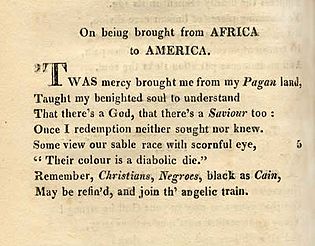
The Wheatley family of Boston taught her to read and write and encouraged her poetry when they saw that she had talent. The Wheatleys' 18-year-old daughter, Mary, first tutored Phillis and their son Nathaniel also helped her. John Wheatley was known as a progressive throughout New England; his family gave Phillis an unprecedented education for an enslaved person or a female. By the age of 12, Phillis was reading Greek and Latin classics.
Despite being emancipated shortly after the publication of her first work in 1773, her life was not easy; two of her children died as infants, her husband (who she married in 1778) was imprisoned for debt in 1784. Shortly after, she fell into poverty and died of severe illness.
Life and Legacy
I’m sure even Phillis herself wouldn’t have believed that 12 years after she was sold into slavery at age 7 or 8, she would become a successful poet and the first Black female to be published. However, I’m sure she would have been grateful for the opportunity and platform that London gave her. One letter of Phillis Wheatley’s gives a short account of her trip to London, dated October 30 1773 and written to Obour Tanner, an African-American woman in Rhode Island, it also forms what some scholars have called ‘the first African-American women’s writing community’.
“The friends I have found there [London, England] among the nobility and gentry, their benevolent conduct towards me, the unexpected and unmerited civility and complaisance with which I was treated fills me with astonishment. I can scarcely realize it. This I humbly hope has the happy effect of lessening me in my own esteem.”
Phillis Wheatley was not someone I had heard of until I was doing some research for the exhibition Rights for Women: London’s Pioneers in their Own Words here at Senate House Library. I’m pleased to have now read a lot of her works and I hope that despite her short lived fame back in 1773 and relatively short life, her story will be continued.
Please help to ensure Phillis' legacy is continued by sharing her story on social media #RfW18 #RememberHer #LeadingWomen
Rebecca Simpson
Communications & Engagement, Senate House Library
Further reading:
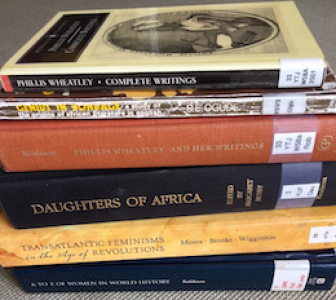 Phillis Wheatley – Complete Writings 1753-1784
New York : Penguin Books, 2001.
Phillis Wheatley – Complete Writings 1753-1784
New York : Penguin Books, 2001.
Genius in Bondage – a study of the origins of African literature in English by S.E. Ogude, Ile-Ife, Nigeria: University of Ife Press, c1983.
Phillis Wheatley : biography of a genius in bondage, Vincent Carretta, Athens, Ga.: University of Georgia Press, c2011.
Phillis Wheatley and her writings by William H Robinson, New York ; London: Garland, 1984.
Daughters of Africa – An International Anthology of Words and Writings by Women of African Descent From the Ancient Egytian to the Present Edited by Margaret Busby, New York: Pantheon Books, ©1992.
The Trials of Phillis Wheatley, Henry Louis Gates, 2010
Transatlantic Feminisms in the Age of Revolutions Edited by Lisa L. Moore, Joanna Brooks & Caroline Wigginton, Oxford: Oxford University Press, 2012.
A to Z of Women in World History by Erika Kuhlman, New York: Facts On File, c2002.

